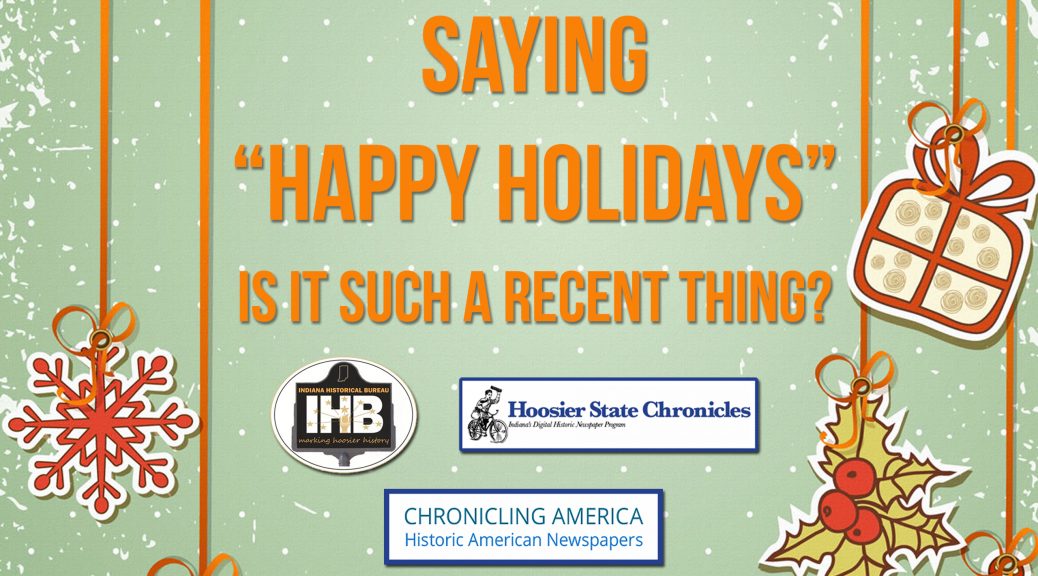There’s one tradition that often gets misunderstood during this time of year, especially among us Americans: it’s using the phrase, “Happy Holidays.” Some folks think that using this term, instead of saying “Merry Christmas,” “Happy Hanukkah,” or any other specific holiday, diminishes the importance of this time of year. They think the term is too recent, modern, and without a tradition of its own. However, when one does a little digging, you’ll soon find out that the phrase has a long and treasured history here in the United States and even in the Hoosier State.
Learn more Indiana History from the Indiana Historical Bureau: http://www.in.gov/history/
Search historic newspaper pages at Hoosier State Chronicles: www.hoosierstatechronicles.org
Visit our Blog: https://blog.newspapers.library.in.gov/
Visit Chronicling America to read more first drafts of history: https://chroniclingamerica.loc.gov/
Learn more about the history relevance campaign at https://www.historyrelevance.com/.
Please comment, like, and subscribe!
Full Text of Video
Oh, the holidays are upon us! Soon we’ll all be sitting by the fireplace, sipping eggnog and enjoying time with our families while we open presents and watch the snow fall outside. Yet, there’s one tradition that often gets misunderstood during this time of year, especially among us Americans: it’s using the phrase, “Happy Holidays.” Some folks think that using this term, instead of saying “Merry Christmas,” “Happy Hanukkah,” or any other specific holiday, diminishes the importance of this time of year. They think the term is too recent, modern, and without a tradition of its own. However, when one does a little digging, you’ll soon find out that the phrase has a long and treasured history here in the United States and even in the Hoosier State.
The term “holiday” dates back to the 15th century, as a variation of the 12th century term “haliday” and the Old English word, haligdæg. The word itself is your classic mashup, taking the words “holy” and “day” and making them a proverbial pair. In the United States, “holiday” generally refers to a day of celebration or specifically to the “holiday season,” a period of time between November and January that comprises a string of holidays, including Thanksgiving, Christmas, Hanukah, Mawlid an-Nabi, Kwanza, and New Year’s.
So, that’s “holiday,” but what about “happy holidays?” Contrary to popular belief, using “happy holidays” in United States goes back to as early as the 1840s. Peruse some historic newspapers and you’ll get a sense of how far back it actually goes. The December 25, 1843 issue of the New York Herald and the New York Daily Tribune ran a poem entitled, “The Christmas Holidays,” which starts with the stanza:
The merry, happy holidays,
Are with us here once more,
Adieu with glee to FORTY-THREE,
And welcome FORTY-FOUR.
Each lady fair expects her beau
Some present nice to bring,
And Santa Claus makes every child,
As happy as a King.
Serialized literature also served as an avenue for popularizing “Happy Holidays.” In Indiana, the Evansville Journal published a short story in 1845 by Anna Maria Hall called, “The Wise Thought,” in which she uses the phrase within the context of the Christmas Season. “What bustle, what preparation, what dancing, gave the country folks enough to talk about during the happy Christmas holidays, I cannot describe,” she wrote.
However, when one looks at data trends, the term really took off in the second half of the nineteenth century, starting in the 1860s. This was a result of many factors. The Civil War’s bitter divisions encouraged a reunification of the country, and the rise of a mass communications culture, particularly with newspapers, facilitated such an effort. One such avenue for this reunification was consumerism. Advertisers encouraged the use of “happy holidays” as a way to appeal to a broader swath of customers. Mass immigration during the mid-to-late nineteenth century, coupled with new, native-born religious traditions, contributed to an increasingly diverse religious culture. Catholics, Jews, Eastern Orthodoxies, evangelicals, and a wide variety of religious beliefs became the new norm in American life. Saying “happy holidays” celebrates past traditions while encouraging new ones.
This became even more prominent in the 20th century, with newspapers using “happy holidays” in broader ways. Indiana newspapers provide countless examples of it. The South Bend News-Times, the Jewish Post, the Sullivan Daily Times, the Greencastle Daily Banner, and the Indianapolis Recorder all include advertising that uses “happy holidays,” both in connection to Christmas as well as the general season. This is no coincidence. Like with the Gilded Age, the mid-twentieth century’s continued use of mass consumerism and unification culture was a direct result of World War II, which had ripped the world apart. After the war, a new wave of mass immigration and religious diversity encouraged overarching cultural terms, like “happy holidays,” as a way to include the nation’s newest citizens. America has always been at its best when it seeks inclusion and unity, and the growing use of “happy holidays” is one small, tangential aspect of these values.
Now, what can we draw from this? First, using the term “happy holidays” dates back much farther than is usually considered and its use in newspapers is often directly tied to Christmas. Second, advertising used the phrase in a many ways, both around the country and here in Indiana. Third, a mass consumer culture, coupled with a growing religious and ethnic diversity, actively encouraged phrases like “happy holidays” that appealed to a wide customer base and the nation’s yearning for unity. So, saying “happy holidays” not only has a long and nuanced history, but it actually reaffirms all the different holidays during this time of year. With that in mind, I’ll unabashedly say it during my family get-togethers this month and I hope you will, too. Happy Holidays!

